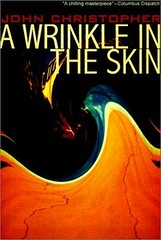
The Ragged Edge (1966) - John Christopher
[originally published in the UK as A Wrinkle In The Skin(1965)]
This is the second John Christopher book that I've read. The first was titled No Blade of Grass and it took the premise of a worldwide environmental disaster (grass disease) and showed the breakdown of (British) society.
The Ragged Edge again hangs its story on environmental apocalypse but this time it is global tectonic activity that kills most everyone in their collapsed houses. The protagonist survives the quake on the Channel Islands off the southern coast of the UK. Then he basically joins up with other survivors and ultimately leaves the islands in search of family. The writing is quite clipped and the story is paced well. There are some extremely vividly imagined scenes.
This novel falls into the sub-genre of what I would call early-'60s UK disaster fiction which, though it may seem strange, was a fairly strong movement. Some have termed this the "cosy catastrophe" movement and was likely started by John Wyndham's The Day of the Triffids in 1951. Some other UK writers in this group include:
John Wyndham
- Re-Birth [The Chrysalids] (1955) -- After nuclear war, mutants are rooted out. But some mutants have telepathic powers and represent real hope for future
JG Ballard
- The Wind from Nowhere (1962)
- The Drowned World (1962)
- The Crystal World (1966)
- The Burning World (1964)
John Christopher
- The Ragged Edge (1965)
- The Long Winter [The World in Winter] (1962)
- No Blade of Grass (v.t. The Death of Grass) (1956)
- The Year of the Comet (1955)
Christopher Priest
- Fugue for a Darkening Planet (1972) - Recently reviewed by Olman
D.G. Compton
- The Silent Multitude. (1966) -- Spores from outer space eat concrete, so civilization literally crumbles.
Nevil Shute
- On The Beach (1957)
Charles Eric Maine
- The Tide Went Out. (1958) -- Nuclear tests cause oceans to drain away under earth's crust.
Michael Moorcock
- The Black Corridor. (1969) -- Astronaut saves a few people from nuclear war but suffers intense psychological horrors
Brian Aldiss
- Greybeard (1964) -- Nuclear tests in space doom us to sterility
In general, there often seems to be to be an upper middle class protagonist who is calm, rational and pretty astute at seeing the new relationships among men in the post-apocalyptic world. In The Ragged Edge, Matthew sees the easily the hierarchies among the men and "sluttish" women but when it comes to the women of his class, he is naive to the new realities of rapine.
In addition to the rationality, it is the hero who is the one that keeps some remains of the old order intact. He helps the wounded, gathers the group together, placates or kills the meglomaniac, etc. In short, takes care of shit.
By no means do all the above novels follow the pattern but most of them contain some element of it.It seems as the genre progressed through into the '60s, the final acts of these novels became more pessimistic perhaps reflecting a world view where the postwar realpolitik of nuclear cold war dominated that of the ethical British ideal.
I would definitely recommend this book as worth reading in the context of the genre but if one was just starting out in these sorts of books there are others I would suggest reading first.

4 comments:
Nice review...so through. What others would you suggest first?
Thanks. Probably one of the Wyndham books and definitely a Ballard. The Wind Fron Nowhere is insane and cool. Also, the Nevil Shute is a true classic of the genre.
Great overview and interesting start at a theory. I was going to ask the same question buzby did, about what order you think is best.
Your analysis made me think about why this subject was so interesting to the british at this time? Many of them were probably quite young during the blitz and I'm sure that really gave them a good sense of the kind of destruction that human tribes can bring to one another. But at the same time, London remained pretty socially controlled during WWII. There was none of the societal breakdown that happened in say Berlin or Japan after the war.
What was it about this period (the early 60's) that cause so much uncertainty towards the future in England? Was it there waning dominance in the face of North American power? The encroachment of modernity with the social liberties and immigration of the '60s? I think this would be interesting to explore in more depth.
I just read this book (I'll post it soon). I really found it to be a tight and gripping narrative with a nice overall development of the main character. It didn't get as rough as it could have, but threatened. Man, the troubles!
Post a Comment